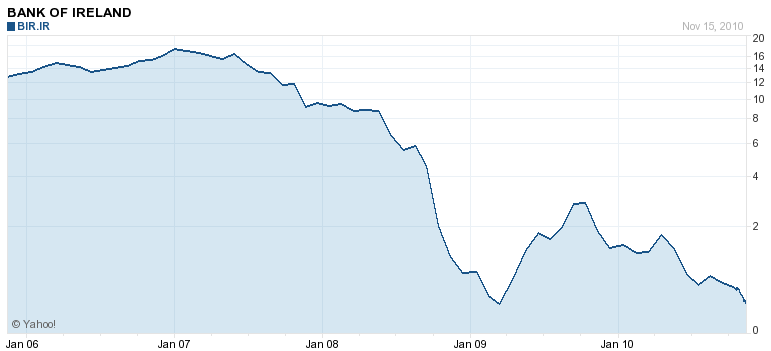Nothing.
That is the outcome of EU finance ministers in Brussels on November 16. The “Statement of the Eurogroup on Ireland” couldn’t have been less void of content (“The Eurogroup welcomes the significant efforts…”). Ireland resisted a bail-out package which officials from the ECB, Spain and Portugal had been pressing for (the contagion effect on those two countries has been severe).
Next step: A team of EU and IMF (International Monetary Fund) officials will be sent off to Dublin for a “short and focused discussion” on the country’s debt crisis. [“We have ways of making you accept our bail-out.”]
Meanwhile the UK is panicking as more than 2 million UK savers have money deposited with Irish banks. According to The Telegraph (“How safe is your money in an Irish bank?” – 15 Nov 2010) GBP 10bn is deposited at Bank of Ireland alone.
As the UK does not want to participate in a rescue for the Euro (they never liked it) British chancellor Osborne is now considering giving “billions of pounds” (FT Nov 16, 2010 “Crisis team heads for Dublin”) in loans directly (easier to sell to voters domestically as the UK shares a land border with Ireland).
Bank of Ireland, once trading at EUR 18, is a shadow of its former self (now at 0.39). The market cap of EUR 2bn amounts to a quarter of shareholders’ equity per June 30th (which miraculously increased from 6bn to 8bn due to some 1.3bn gain on “liability management exercises” and “changes in pension benefits” – source: Bank of Ireland interim report June 30 2010 page 4).
 Bank of Ireland share price. Source: Yahoo!Finance
Bank of Ireland share price. Source: Yahoo!Finance
The political cat-and-mouse game will come to a natural end once the state’s coffers are empty or the public embarks on a bank run, whichever comes first.
The only surprising element is the complacency of equity markets regarding the dramatic events in Europe – until now.
